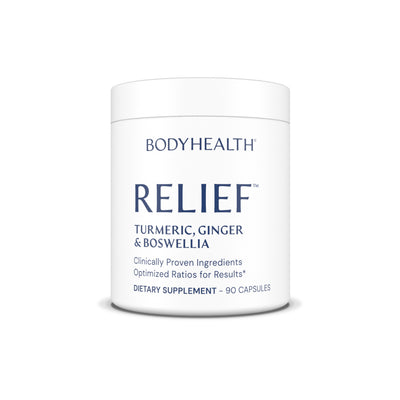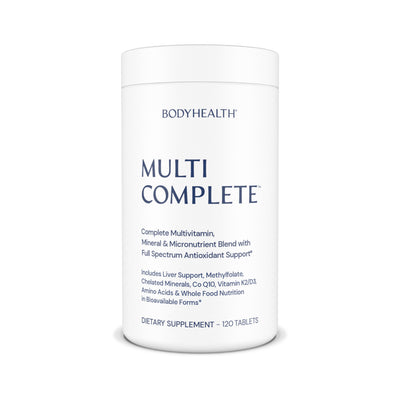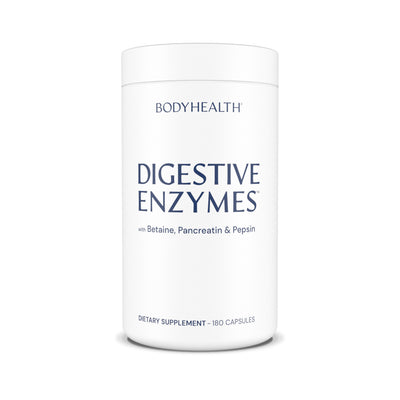Improving Cortisol Levels For Peak Recovery
March 30, 2025 9 min read

If we want the best levels of recovery possible after workouts, exercise, or any performance sports, to continue gaining, not losing, and to be able to either relax or focus easily and when we need to, then we need to look at our cortisol levels.
Cortisol is one of the most important hormones in our body.
It's the hormone that wakes us up in the morning, that starts the healing process in our body after any injury or workout, and that provides us with energy and mental focus when we're running low.
But when cortisol levels go too high, it becomes something else.
It can cause muscle loss and prevent muscle gain, cause fat storage and prevent fat loss even when we're exercising, cause low energy levels, cause us to feel stressed, prevent relaxation and cause poor sleep, and even slow or prevent healing and recovery.
If you have trouble with any of the above, it's likely that higher than normal cortisol levels play a part, something very common in society today.
So let’s dive in and see what cortisol is, how it works and how we can balance our levels.
WHAT CORTISOL IS & HOW IT WORKS
If you’ve ever had a shock and felt the adrenaline surge in your body, then you’ve felt cortisol.
It’s a wake-you-up, get-you-ready-for-action hormone.
It hits its lowest point around midnight, so you can sleep, and then peaks about an hour after you’ve gotten up in the morning, getting you to wake up and get ready for the day.
It’s nick-named the “stress hormone” because it’s also released in moments of stress. So in a dangerous situation, or if you get scared suddenly, you’ll feel it.
And it’s important. It’s a hormone we can’t live without… when it’s in balance.
But when it goes out of balance, it can cause us a lot of trouble:
- It raises our stress levels, makes us irritated, and causes us to have poor sleep.
- It reduces blood flow, causes lactic acid to build up in our muscles, causes muscle breakdown, and slows muscle recovery.
- And it lowers our testosterone, growth hormone, and progesterone levels, hormones necessary to build muscle and keep off excess body fat.
- At the same time, it works to lower insulin secretion while simultaneously damaging the cells and increasing insulin resistance (where our cells resist insulin’s message to take in sugar for energy).
- This insulin resistance then leads to high levels of insulin in the future, as your body must release more insulin to get your cells to take in sugar. And, as insulin is also a body fat building hormone, this high insulin leads to higher levels of body fat, especially around the mid-section.
- But insulin resistance also leads to the cells having less energy, which causes the hunger hormone, ghrelin, to be released to make you hungry. You don’t need this food, but as your cells aren’t getting the food that is there, because it’s being converted to body fat, they think you must need more food, so they cause these cravings.
In short, too high cortisol levels can lead to: fatigue, irritability, headaches, intestinal problems such as constipation, bloating or diarrhea, anxiety or depression, increased blood pressure, low libido, erectile dysfunction or problems with regular ovulation or menstrual periods, difficulty recovering from exercise, poor sleep, and muscle pain or tension in the head, neck, jaw, or back
And all of this leads to excess fat that is hard to get rid of, slow or no gains in building muscle (even muscle loss), and poor recoveries.
If we want to achieve peak athletic performance, we need to have high natural energy levels, and we need to be able to relax, sleep, and recovery properly and fully.
High cortisol only slows or prevents this.
CORTISOL PREVENTS PROTEIN SYNTHESIS FOR RECOVERY
Our body mainly uses fats and sugar for energy. Enzymes break them down, the hormone insulin ushers them to our cells, and our cells take them in and make something called ATP from them, the energy source that cells use.
But with protein, or the amino acids that make up protein, our body is supposed to use this for building and maintaining muscle, bone, hair, hormones and much more.
It’s not supposed to be used for energy, but for building and maintaining our body’s structure.
Cortisol reverses this.
Cortisol is key in emergencies, both short term and long.
In an emergency, which to the body could be anything from a bad injury or just being tired from overwork or lack of sleep, cortisol works to supply your body with energy so you can get out of this situation and survive.
In a war, if your ankle is broken, cortisol helps you get home. It’s vital in emergency situations.
But it also thinks long term. From cortisol’s view, if you’re tired or hurt, then possibly lean times lay ahead. How can you “catch” food to eat if you’re exhausted or hurt?
You can’t. So it’s time to start saving up energy sources. And body fat is the best future energy source there is.
So cortisol sends instructions to turn sugar already in the blood stream or from food that you eat, into body fat, to save for later when there’s no food.
And for energy… it starts breaking down muscle. Exactly the opposite of what we need for recovery.
If you know the principles behind PerfectAmino, you know what I’m speaking of. Our muscles are made of protein, which is made of amino acids.
And amino acids can be an energy source.
We know that excess amino acids, that the body can’t use to synthesize new protein, go through a process called gluconeogenesis, which breaks the amino acids down, and converts them, in part, to glucose — sugar.
This glucose can then be used as energy.
But cortisol doesn’t get this from excess amino acids. Instead, it gets it from the amino acids that already form the protein in your muscles.
It doesn’t want to use fat stores for energy, it wants to build them for energy in the future.
So instead, it starts breaking your muscle cells apart, to release the proteins in them, and break them down into their individual amino acids to convert to energy.
But this causes muscle loss. And if high cortisol levels continue for long, it can lead to muscle wasting, soreness and exhaustion.
But it also prevents muscle building. Why use amino acids to build new muscle when they’re a good energy source?
We can’t use sugar or fat, they have to be saved for the future.
But we can use amino acids.
So high levels of cortisol also prevent the synthesis of amino acids into protein, so the amino acids can be used for energy.
Without protein synthesis, we can’t repair muscles damaged by workouts. So we not only don’t synthesize new protein to build the muscle, we don’t give new protein to repair what’s already there, so we lose muscle when working out, instead of gaining.
Now, this isn’t a black and white process here. Depending on how much cortisol there is, it may just slow recovery, not fully prevent it.
But even that we don’t want.
This is one reason it’s not smart to exercise when you get little sleep or are sick.
Not only is your awareness of your environment impaired, so you may make a mistake and injure yourself while working out. But also, your cortisol levels are much higher.
Cortisol was released, due to lack of sleep or exhaustion, to give you energy for the day. So it’s in your bloodstream, in part, already breaking down muscle for energy.
If you work out, you speed up this process by damaging your muscle.
Because, as cortisol is present, protein synthesis for muscle recovery is much slower. And if you’re sick, as the amino acids are needed to make immune cells, muscle recovery may be next to zero.
A workout, in these conditions then, may lead not only to no gains, but losses instead.
If you are sick or have over-trained and are exhausted, the solution is to increase amino acid intake to fuel fast recovery and get rest, not try to cause more injury to the muscles which, in this case, would increase cortisol levels more.
So let’s look at what raises cortisol, and what we can do to lower it when it’s high.
WHAT CAUSES HIGH CORTISOL & HOW DO WE LOWER IT
There are a few main things that raise cortisol levels besides illness, injury, and stress from life. (Yes, life stress — mental stress — also raises cortisol levels.):
Lack of sleep, lack of amino acids to repair muscle damaged in workouts, high sugar levels (which cause inflammation in the blood vessels, causing cortisol to be released), and high omega 6 fatty acids (which raise inflammation levels in the body, thus raising cortisol levels), and high toxins in our food, air and water.
Our processed foods are high in omega 6 fatty acids from corn and soy. These are the bases of almost all processed foods, and the feed most livestock is fed now.
Omega 6 is used in cells to create pro-inflammatory molecules which raise cortisol.
To combat this we need to remove these processed foods from our diets and only eat meats that are naturally grass-fed, which allows for lower Omega 6 levels and higher Omega 3 levels in the meat.
And we need to take Omega 3 fatty acids. Omega 3 produces the opposite of what Omega 6 does: anti-inflammatory molecules that lower cortisol.
Next is sugar, especially processed sugars. These raise inflammation in the blood vessels, which releases cortisol. They also raise insulin levels and estrogen levels, which again raise cortisol levels.
And they do us no good. Our body has no real use for them and does not need them. They only cause us harm. So keep to only natural sugars.
Then there is protein and amino acids. When we work out, we damage our muscles. And we need enough protein to help them recover.
If we don’t have enough, then not only do we lose muscle because it’s damaged and can’t be repaired, but also, as this is an injury, cortisol is released. And this cortisol further pushes muscle break-down.
So make sure you’re getting in enough protein and taking your PerfectAmino. And if you feel extra sore or exhausted one day, take more PerfectAmino — your body needs it.
Free radicals also contribute to this heavily, raising oxidative stress and overall mental and physical stress levels and cortisol.
Our Reds contain a wide range of very potent antioxidants to help neutralize free radicals, along with increased adaptogens like reishi mushrooms, cordyceps, and lion's mane to help lower the physical and mental stress these free radicals cause.
It also contains a full microbiome blend to help address the damage these toxins and free radicals do to our beneficial bacteria.
Hydrogen Tablets then help to neutralize hydroxl radicals, one of the most destructive free radicals in our body. No other product neutralizes these, and this is key especially when detoxing.
Multi Complete then contains a full range of all the vitamins our bodies need in a form that is easily absorbed and at the levels our cells need for optimal function and repair of free radical damage.
And Relief, with golden turmeric, boswellia, and ginger helps lower physical and cellular stress levels overall. It's very effective. In fact, taking it before sleep helps achieve deeper sleep and greater recovery.
Then there is magnesium. This is one mineral that your body vitally needs. It’s actually processed out of most foods these days, so most of us don’t get it naturally.
But it helps to calm our muscles and nerves, help us sleep, helps remove lactic acid from our muscles which can cause soreness, and lowers cortisol levels.
So make sure you’re getting in your magnesium.
And finally, sleep.
We need to get our sleep. This is when our growth hormone is released, when excess cortisol is cleared from our blood stream, when repair and recovery and balancing is done in our body.
If we don’t get good sleep on a regular basis this will further drive up cortisol levels, causing poor moods and poor recoveries.
If you’re having any trouble sleeping, make sure to take our Sleep product to help with this.
And don’t work out on a day when you got bad sleep. Just skip that day. It will be better for gains in the long run.
Sleep is also when most of our fat loss and muscle building occurs. And it doesn’t occur when we have poor sleep.
Beyond this, it’s smart to get your inflammatory markers tested.
These can show up any suboptimal conditions, small infections or the like in our body so we can find and address them before they get of hand.
And fixing even something small, which is taxing our body’s immune system, can make a quite a difference on our energy levels, performance and recovery abilities.
I highly recommend it.
Articles by Health Topic
Your Path To Better Health Starts Here!
From in-depth articles on nutritional benefits to updates on new product launches, stay informed and inspired on your journey to optimal health.
*These statements have not been evaluated by the Food and Drug Administration. These products are not intended to diagnose, treat, cure, or prevent any disease.













